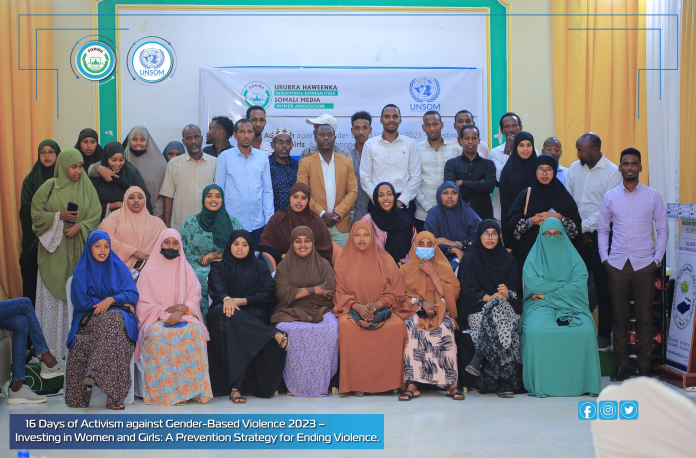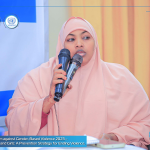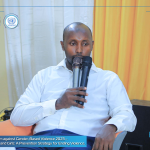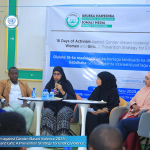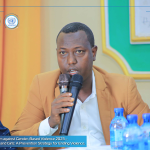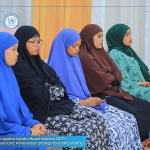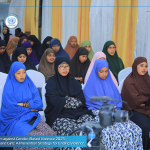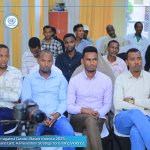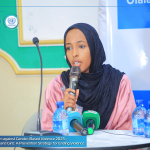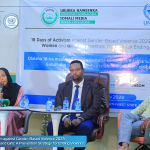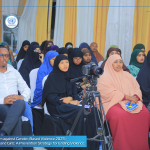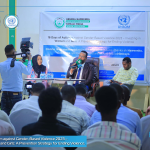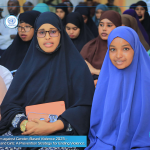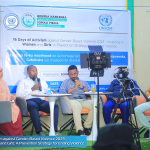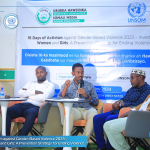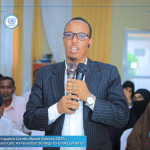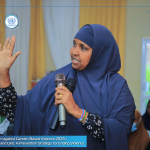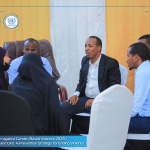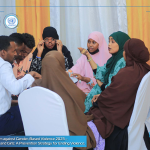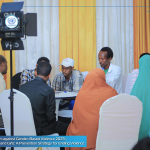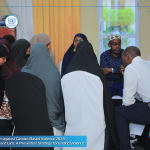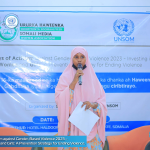On the International Day for the Elimination of Violence Against Women and Girls, SOMWA, in partnership with UNSOM, conducted two panel discussions and group discussions addressing critical issues related to GBV prevention, especially the critical imperative to increase investments as a prevention strategy.
As part of the open discussion, five experts and professionals, including the deputy attorney general of the Southwest State of Somalia, members of women organisations, youth organisations, community elders, and marginalised groups, and fifty participants represents the face of Baidoa were invited.
At the opening of the event, Maryan Seyalc, the executive director of the Somali Media Women Association (SOMWA), stated that Somali women and girls face gendered obstacles from home to the community, and besides all the odds, they contributed to the country’s peacebuilding with the denial of a seat at the decision-making table. ‘’On this International Day for the Elimination of Violence Against Women and Girls, I would like to call on all Somali men to respect the rights of women that Islam gave to us and stop double-victimising women’’ Mrs. Seylac.
Opening the event, Abdifatah Ali Yusuf, the minister of information for the South West State of Somalia, highlighted that SWS does not tolerate any form of abuse against women and girls. He added that there have been incidents, but I can guarantee you that the justice system is ready to handle them.
The first panel discussion was focused on the causes and consequences of violence against women and girls in SouthWest State. It was highlighted that GBV remains prevalent among IDPs, with women being subjected to sexual abuses like rape in the camps. Seynab Omar Ali, chairperson of the Bay Women Association Network, argued that young girls usually encounter a painful cycle: they often miss school as they become married off at a young age, continue to have babies, and later become early divorcees and start to struggle with daily life.
Rahma Mohamed Ali, the deputy attorney general of SWS, who was among the panellists and was asked if her office receives GBV cases, answered that most cases to which they are referred are attempted rape and some rape cases. However, she emphasised that the most difficult cases of rape involve the intervention of traditional leaders who solve things unfairly and, in some cases, force the victim to marry her preparator.
Still answering the causes and consequences of gender-based violence, Dr. Adan Mayow emphasised that Somalia’s traditional culture does not support women, and because of the long-existing oppressive culture, women themselves do not believe in themselves, and it will take time for them to gain self-confidence.
Panellist Malaaq Feysal, one of the SWS elders, was asked why elders, including him, do not select women for parliament seats. He told the participants that his clan, as one of the minority groups, has one seat at the parliament, and that seat was given to a man. He added that he understands the importance of women’s political participation and promised that next time there is an election, the seat will be given to a female.
Seynab of the Bay Women Association Network says that some men, when they divorce their wives, also divorce their kids, and that women who most likely did not go to school or never worked before won’t be able to send their children to school or feed them. Furthermore, these children, who grew up in broken homes, are taken advantage of by Al-Shabaab.
The second panel discussed the best practices and innovative solutions for investing in women and girls as a prevention strategy for ending violence in South West State.
Talking about investing in women and girls, Seynab, of the Bay Women Association Network, expressed that she believes we should create job opportunities for women and girls, such as teaching crafts, sewing and henna, so that they can achieve economic self-sufficiency.
Deputy Attorney General Ms. Rahma and some of the participants highlighted the importance of laws that protect women and girls against gender-based violence.
Shaati, observed that men are accused of being the perpetrators of violence against women and girls, so in order to end this violence, they must partake and participate in ending it.
The panelists and participants have jointly suggested more awareness about the dangers of early marriage and the imperative to eradicate female genital mutilation or circumcision (FGM/C) in Somalia.


